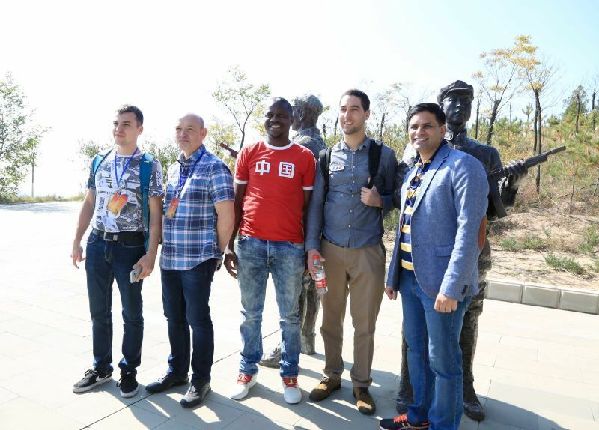Eighty years on, the Long March remembered
- By Christopher Georgiou
 0 Comment(s)
0 Comment(s) Print
Print E-mail China.org.cn, October 19, 2016
E-mail China.org.cn, October 19, 2016
|
|
|
Foreign experts from Britain, Nigeria Russia and Pakistan pose for a picture in Wuqi town of Yan'an city, Shaanxi Province on Oct. 18, 2016. [Photo / China.org.cn] |
In August 1934, the 1st Red Army was facing annihilation in Jiangxi Province by the Kuomintang (Nationalist) armies led by Chiang Kai-shek. Having been encircled for the fifth time, the Red Army leadership decided that escape and retreat was the only viable option. The scouts scouted a potential weak spot in the encirclement and with diversionary tactics and a rear-guard defense, the main bulk of the army made its way through the chink, eventually suffering heavy casualties at Xiang River as they managed to break through and begin what was to become the epic of the Long March.
'Long' is an understatement in terms of the distance travelled and sheer human endeavor and sacrifice. Thousands of miles later, with thousands of lives less, after a long year the battered and bruised Red armies reunited in the northern city of Yan'an, Shaanxi Province, in October 1935.
Whatever ones political background and beliefs are; even the chasing and frustrated Kuomintang army would be surprised and amazed at the magnitude of the sheer scale of the human feat. To walk thousands of miles through the most inhospitable conditions of sinking mud, mountains and freezing weather conditions while being raided and chased by a stronger army, is one of the most remarkable exploits in human history and, also, one of the most important and influential contributors effecting the new world order.
This year, the 80th anniversary of the Long March Victory, coincides with the 40th anniversary of Chairman Mao's death. It is particularly important to remember the Long March, as this is when Mao's most prominent character traits of strength, leadership and determination were exemplified. The army required discipline and direction and he gave it the management and guidance to avoid annihilation.
This was in contrast to the leadership of Zhang Guotao, the General of the larger 4th Red Army which was almost completely destroyed. After rendezvousing with the 1st Red army in Lianghekou in late June 1935 and combining forces, General Zhang insisted on following a southwesterly diversionary route, while Mao preferred to carry on north. The armies split. This was a fateful decision by Zhang and his army was devastated as it was intercepted by Chiang Kai-shek's forces.
It was a pivotal moment in not only Chinese history but world history. After the Zunyi Conference, and upon arrival in Yan'an, Mao's determination and commitment cemented his position as leader of the CPC.
Struggle
Those who died in the Long March for their party and country must be remembered, including Mao's younger brother, Mao Zetan, who courageously died fighting a rear-guard action to allow the main army to tactically retreat. Many died from Nationalist and local warlord attacks, bombardments, executions after being captured as well from the cold weather on the year long struggle towards Shaanxi Province. We must remember those that didn't make it but gave their lives to make sure the Long March was completed.
The March was a struggle, and not a pretty one. A struggle for life and death in a war zone; for ideology and a determination to transform a proud country suffering from a 'century of humiliation' of foreign imperialism. It set the tone for the class-struggle, the fight against Japan and the liberation of China from foreign concessions.
While the struggle was won, China has achieved remarkable achievements since then. Yet, progress continues, with over 50 million people in rural areas still live in poverty - the march must go on.
Opinion articles reflect the views of their authors only, not necessarily those of China.org.cn.






